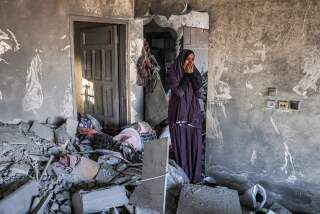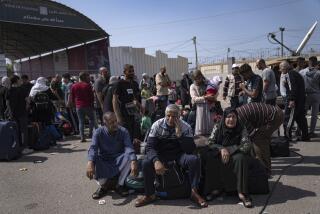Murder in God’s Name
- Share via
Tour operators have arranged the hasty withdrawal of hundreds of foreign tourists from southern Egypt in the aftermath of Monday’s carnage near Luxor. The scenes are reminiscent of an evacuation of civilians from a war zone, which in a sense Egypt has become.
The Egyptian government’s confident recent claim that it had largely neutralized extremist religious groups, including Gamaa al Islamiya, which on Tuesday claimed responsibility for the slaughter, has now been exposed as wishful thinking. A handful of conscienceless fanatics were able to conduct a prolonged orgy of killing before their grisly labors were finally interrupted by police intervention. Egypt has a very large internal security force; its failure this week to provide adequate protection for the tourists and later to mobilize rapidly to save them demands to be explained.
The blood bath at the Temple of Hatshepsut was another act of terrorism aimed at crippling Egypt’s $3-billion-a-year tourist industry and discrediting President Hosni Mubarak’s secular government. The killing of the tourists, at least 58, quickly elicited universal condemnation, with criticism coming even from some quarters associated with terrorist acts. Iran radio, while deploring the massacre, predictably added its own bizarre spin, suggesting halfheartedly that the whole thing might have been a “Zionist plot.” All external condemnation is nonetheless appropriate, because it’s important that Egypt’s indigenous fanatics know that the religious convictions they assert to justify their outrages have little support or approval in the larger Islamic world.
The lack of a foreign cheering section will not, of course, shame the fanatics into passivity. No one applauds the murderous religious extremists in Algeria, who in the last few years have been able to butcher thousands of civilians thanks in no small part to the regime’s astonishing inability to offer its citizens basic protection.
But the Algerian killers aren’t seeking foreign approval. They want to overthrow the regime and replace it with their own brand of intolerant theocratic rule. That is also the ultimate goal in Egypt, Saudi Arabia, Afghanistan, wherever local conditions encourage the rise of radical religious warriors.
Iran’s Islamic revolution rode to triumph on a wave of disgust with corrupt rule and bitter hostility toward the secular modernism that the powerful nations of the West represent. It has become the inspiration for other power-seeking movements whose members declare they are merely God’s avenging instrument. Suppressing these movements, whether in their homelands or by thwarting their export of terrorism, is very hard. But the alternative is infinitely harder to bear, as the horror at the Temple of Hatshepsut made clear.
More to Read
Sign up for Essential California
The most important California stories and recommendations in your inbox every morning.
You may occasionally receive promotional content from the Los Angeles Times.













